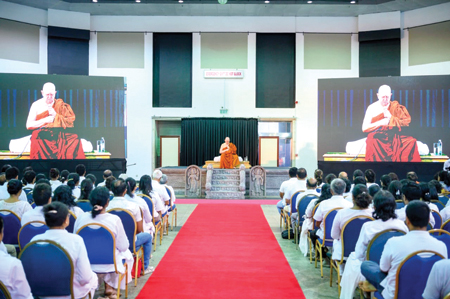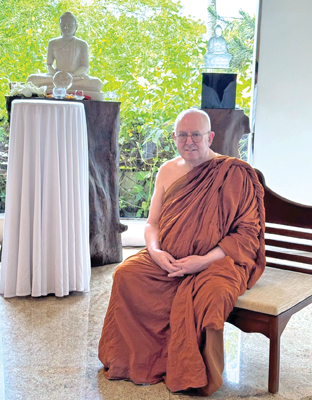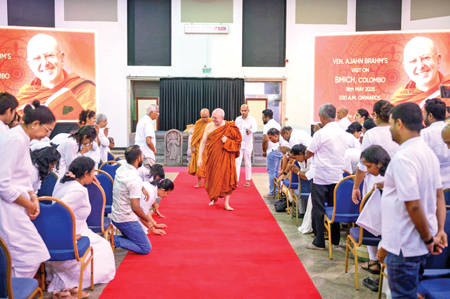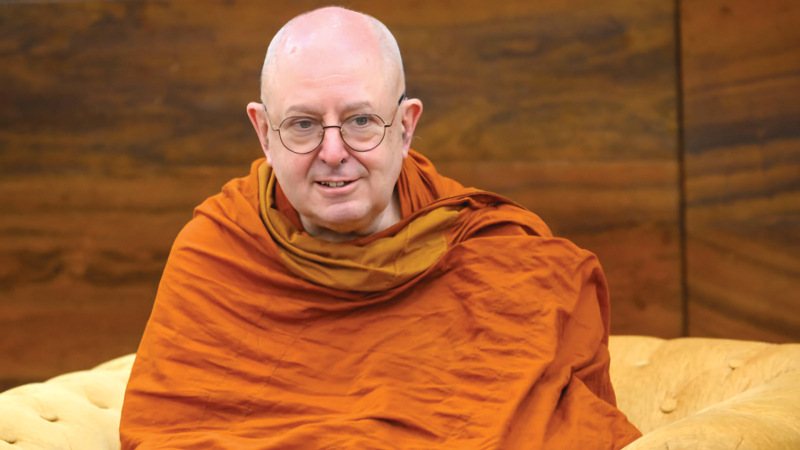Ven. Ajahn Brahmavamso Maha Thera popularly known as Ajahn Brahm is the Abbot of Bodhinyana Monastery, Western Australia and the Spiritual Director of the Buddhist Society of Western Australia. Recently, Ajahn Brahm visited Sri Lanka on a Dhamma tour from May 17 to 25 at the invitation of the Ajahn Brahm Society of Sri Lanka. During his brief but enlightening visit, the renowned meditation guru and Dhamma teacher delivered a public sermon at the BMICH. He also addressed members of both the business and scientific communities. The centerpiece of his tour was a meditation retreat designed for experienced bhikkhus, bhikkhunis, and selected lay practitioners.
The following are excerpts from an interview the Sunday Observer conducted with Ven. Ajahn Brahm on topics ranging from meditation, ‘kindfulness’ to living a stress–free life guided by Buddhist principles.

Ven. Ajahn Brahm delivering
his Dhamma talk at the BMICH
Q: The Fifth Precept is about abstaining from alcohol. Does that mean even drinking a small amount of liquor is considered a sin? Or is it only considered a sin if the person, after drinking, commits a misdeed? What some people usually say is “a little bit” of alcohol is no harm.
A: No. You have to be practical in today’s world. Would we say ‘a little bit’ of breaking any other precept is okay? A little bit of killing? A little bit of stealing? A little bit of adultery? A little bit of lying? So, why do we apply the ‘just a little bit’ reasoning only to the Fifth Precept? That’s my answer to your question.
Q: What’s the best form of giving? I have read that the best form of giving is to do so without expecting anything in return. Am I correct? If this is the case, would it be best to help a complete stranger?
A: The best form of giving is forgiving! I often mention that. You do not always have to give to complete strangers. Don’t plan the giving – if you see somebody and they need your help, help them.
Giving is not just giving donations. There are so many wonderful ways of giving. It’s like giving some food to somebody or giving somebody a chance. You may be able to get somebody a job, who needs it, or for me, I don’t have funds, so sometimes when someone opens the door for me, I smile at them. Thus, there are so many ways of giving. It’s also encouraging other people to give. We are sharing. We live this life together. It’s like being in the same boat, going towards Niagara Falls and we don’t want to fall over. So, we all give a hand to one another to make sure that everyone can survive.
Q: Regarding our duty to parents, the Buddha taught that one can never fully repay the debt owed to one’s parents, no matter how well we treat them. Am I correct?
A: Yes, exactly.
Q: But what if there is a child who has been abused by their parents? For instance, someone told me about a woman who was subjected to abuse by her mother as a teenage girl, after the mother remarried following her husband’s death. In such a scenario, she asked me whether she still needed to look after or treat her mother well. What is your view?
A: Yes, you still treat her as well as you possibly can because she is your mother, and that’s reason enough to treat her well. But you also have an obligation to treat yourself well at the same time. There’s a saying from Chinese culture: It’s always important to love the tiger, but from a distance. In other words, the way you show love to your mother must not compromise your own safety and well-being. I tell this to many people who have been abused.
Even if your mother won’t open her door to you, that’s fine. You can still send her a small donation on special occasions, or a little card saying “Happy birthday, Mummy.” What she does with that card and any money inside is totally up to her. The important thing is that you’ve shown kindness and love to her—from a safe distance.
 Q: Of the Five Precepts, not telling lies (the Fourth Precept) can sometimes feel like the hardest to keep. For example, if someone criticises a third person while speaking to you, and later that third person asks whether anything was said about them, how can you answer truthfully without breaking the Precept or hurting anyone? In such a situation, is it acceptable to remain silent instead of answering directly?
Q: Of the Five Precepts, not telling lies (the Fourth Precept) can sometimes feel like the hardest to keep. For example, if someone criticises a third person while speaking to you, and later that third person asks whether anything was said about them, how can you answer truthfully without breaking the Precept or hurting anyone? In such a situation, is it acceptable to remain silent instead of answering directly?
A: Certainly. Not just to be quiet, you can also ask, “Why are you asking me that?” So you can still be truthful, but also protect yourself and protect others as well. It’s amazing how you can use language, speak the truth, and not get into any trouble.
I like the story of the Dutchman—I don’t think he was a Buddhist, but he was well-known. I think he was a professor of ethics, and he was hiding a Jewish family from the SS during the Second World War in his home. He knew that if the SS came and asked about other residents in his house if he said no, that would be lying. If he said yes, then he’d be executed along with the family. So, he said, “Come and find out for yourself.” They opened the door and he let them in. Because he was such an honest person, they said, “Alright, no worries,” and they went to the next house.
That’s a true story. I was quite impressed by that. A lot of times you don’t need to tell lies. And that’s when you have a very good moral conscience. I don’t know why that happened, but I would say it’s maybe because other beings in this universe were helping.
Q: Focusing on the breath during meditation, is it correct to observe only the inhalation, or should both the inhalation and exhalation be observed?
A: No, nothing is correct. Meditation is a process. You start at one point and gradually move through. It’s just your attitude behind the meditation that matters. What are you trying to do? What is your goal? If you have any goal at all, that’s not a good way of meditating. Meditation should not be about trying to achieve or get something.
So many Sri Lankans, just want to become Sovan (become Sotapanna). And that stops them from getting close to Sovan! Just wanting to achieve it becomes an obstacle. In meditations, my teacher, Ajahn Chah kept saying this again and again.
You meditate to let go of things, not to gain things. And when you meditate, you’ll see how much you can let go of. One way of understanding that is, when you are at your computer and zooming into something, things on the outside drop away. On the periphery, they disappear. And that’s how we let go of things. We start by letting the mind stay in the present moment, and the past and the future disappear. We don’t really try to get rid of the past and future. The more you try to deal with the past, or try to get rid of worry for the future, the stronger the past and future become. So, instead, focus on this moment, allow this moment, like this moment. Move into it. Then the past and future do vanish.
During meditation, please stop trying so hard. In other words, you have to be silent. Don’t try to explain it to yourself. That is too disturbing in the first place. So, please become silent. Silent awareness is important.
Q: During meditation, if a disturbing thought arises, should we stop meditating? Or should we analyse the thought?
A: No. Let it go. It’s like somebody banging on the door. If somebody comes in and bangs on the door, the sound disappears in maybe one or two seconds.

Ven. Ajahn Brahm
arriving at the BMICH
If you analyse it, you get disturbed for minutes. “Who did that? I know who did that. What can I do to make sure they’re never allowed to come to a retreat again?” Such thoughts are disturbing. The Buddha never had people making any noise under the Bodhi Tree when he became enlightened.
What would happen if people kept on making a noise when the Buddha was meditating at Bodhgaya and made much more noise than that person who banged on the door?
So, just let it go. Don’t analyse thoughts!
Q: In this business world which is founded on making profit, how can we make use of the teachings of the Buddha successfully?
A: You do need some profit, otherwise no one can afford to build Viharas like this. But profit is not the main thing. What truly matters is how the work environment affects the people who come to work there—how you treat them with kindness and support. Most importantly, the most profitable businesses are often the ones built on kindness and care.
The Buddhist Society of Western Australia, has been running for 42 years. People work there. Recently, one of the two administrative officers was diagnosed with thyroid cancer and she had to undergo a disturbing operation. She has two young children, and during this challenging time, she received all the support possible with childcare and more.
And I was really surprised, that almost a day or two after the operation, she came back to work. We told her that we don’t need her to come back to work this soon. But she said, “I love working in this place and I really enjoy it here. That’s why I’m back even though I don’t really have to be.” What it tells me is that the culture at the Buddhist Society of Western Australia is good. It cares about people. As a result, people genuinely want to work there.
Imagine waking up on a Monday morning and actually looking forward to going to work. Being a journalist is a wonderful job—you get to write about fascinating topics, and some of them really inspire you. So, go for it!
– Part 2 of this interview will be published next week.









